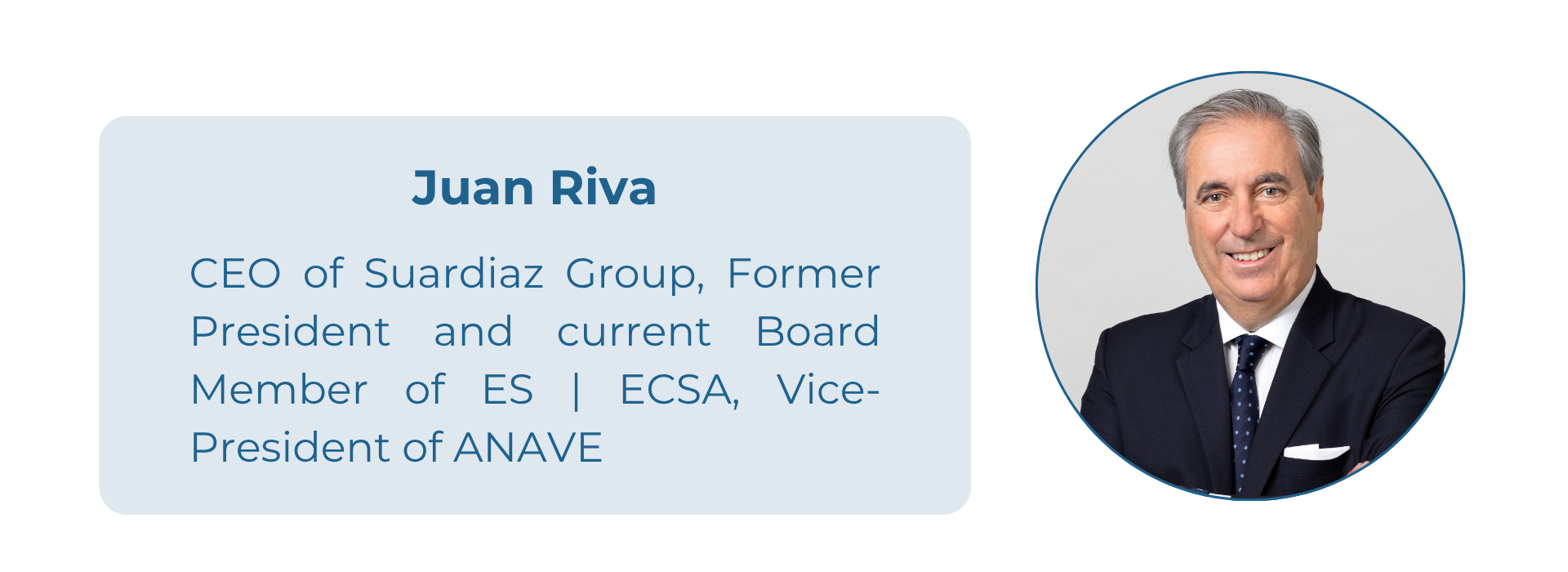Shipping People: Juan Riva
In the 7th edition of the interview series #ShippingPeople – meet the European Shipowners, we hand the microphone to Shipping People: Juan Riva, CEO of Suardiaz Group, former ECSA President and current European Shipowners | ECSA Board member.
Meet Juan Riva, CEO of the companies that make up the Suardiaz Group, focused on air, sea, and land transport and President of Suardiaz Shipping Lines, one of Europe’s leading car carriers. Juan Riva holds a long a impressive career in shipping, and has among others served as President of the Spanish Shipowners Association (ANAVE) from 2003 to 2009 and as ECSA President from 2011 – 2013.

Considering Europe’s goal to meet climate neutrality by 2050, which are the main challenges for shipping? What innovative technologies or alternative fuels do you see as solutions to reduce emissions and achieve the climate targets?
One of the main challenges for shipping in Europe’s path to climate neutrality by 2050 is the lack of mature, scalable and cost-effective low-emission technologies. The sector relies heavily on fossil fuels and struggles to access green alternatives for long-distance, high-powered vessels. Infrastructure for alternative fuels remains limited, and regulatory uncertainty and bureaucracy are major obstacles.
Clear, predictable regulations and financial support are essential, particularly for SMEs, which form the backbone of EU shipping. Without this, shipowners risk delaying decisions or making early investments that may not be viable in the long run, harming competitiveness.
In the short term, biofuels are the only realistic alternative. At the same time, major investments in infrastructure and specialised skills are needed to support the uptake of ammonia, methanol or other low-emission fuels. Energy efficiency, digitalisation and operational improvements will also be key to reducing emissions and ensuring a level playing field.
For these solutions to become viable, strong policy support, public and private funding, and international cooperation are crucial, especially to ensure a level playing field and avoid carbon leakage.
The European shipping fleet is one of the largest in the world, enabling the EU to play a leading role in the global supply chains. How do you perceive the strategic role of shipping for European security?
Shipping plays a fundamental strategic role in European security, far beyond its economic contribution. The EU’s global supply chains—and by extension its industrial, energy and food security—depend on safe and efficient maritime transport. The geopolitical tensions in recent years, including disruptions in the Red Sea or the Black Sea, have clearly demonstrated how vulnerable Europe is to maritime chokepoints. A strong, resilient European fleet is essential not only to guarantee the continuity of trade but also to reduce dependence on third countries for critical logistics services.
Moreover, shipping contributes directly to Europe’s strategic autonomy, particularly when vessels are owned, operated and crewed by European companies and citizens. For this reason, the EU must actively support its shipping industry through competitive frameworks, fleet renewal, and training of European seafarers, ensuring long-term maritime sovereignty.
Could you share with us some good practices aimed at decarbonising the shipping industry that your company has been involved in or closely monitoring? Could you provide insights into these initiatives, including the technologies employed, partnerships formed?
European shipping companies are committed to reducing their carbon footprint, with Spanish shipowners—who control less than 1% of the EU fleet—already investing €800 million in cleaner fuels and technologies. They have an additional €1 billion in projects that could cut GHG emissions by over 500,000 tons.
SUARDIAZ Group is driving this transition through fleet modernization, route optimization in collaboration with clients, using biofuels, and incorporating new more efficient and higher capacity vessels, with a $200 million investment plan over the past five years.
We are also working hand by hand with port authorities in Vigo, Liverpool, and Saint-Nazaire to implement on-shore power supply (OPS), reducing CO2 emissions by allowing vessels to use electricity at berth instead of running engines. However, this depends on port infrastructure, which is being developed in these locations. To further support sustainability and maritime autonomy, ports must work with European shipowners to create green corridors and support and prioritize Short Sea Shipping vessels, strengthening regional connectivity and reducing dependence on external entities.
For press and media enquiries, please contact:
Luisa Puccio, luisa.puccio@ecsa.eu, +32 492 733623

